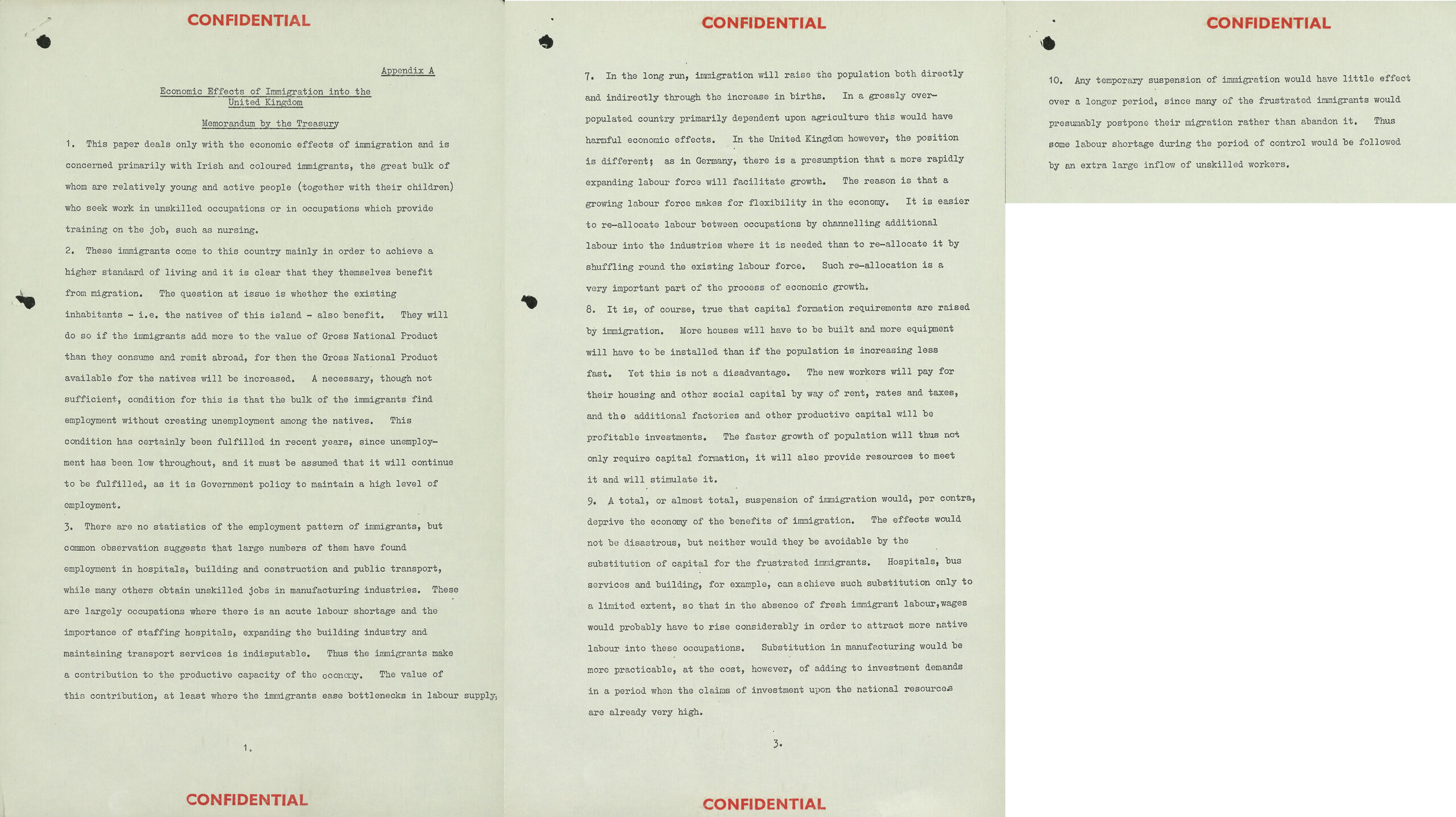
Extracts from a memorandum from the Treasury entitled ‘Economic Effects of Immigration into the United Kingdom’ from July 1961. This could have been part of an attempt to gather information for the Immigration Act passed the following year. Catalogue ref: HO 344/144
- What are the benefits of immigration for the economy outlined in the source?
- Why is it seen as an error to restrict immigration in the long term at this time?
- What other benefits of immigration are not discussed?
- Why do you think this document was labelled ‘Confidential’?
Transcript
CONFIDENTIAL Appendix A
Economic Effects of Immigration into the United Kingdom
Memorandum by the Treasury
- This paper deals only with the economic effects of immigration and is concerned primarily with Irish and coloured immigrants, the great bulk of whom are relatively young and active people (together with their children) who seek work in unskilled occupations or in occupations which provide training on the job, such as nursing.
- These immigrants come to this country mainly in order to achieve a higher standard of living as it is clear that they themselves benefit from migration. The question at issue is whether the existing inhabitants- i.e. the natives of this island-also benefit. They will do so if the immigrants add more to the value of the Gross National Product than they consume and remit abroad, for then the Gross National Product available for the natives will be increased. A necessary, though not sufficient, condition for this is that the bulk of the immigrants find employment without creating unemployment among the natives. This condition has certainly been fulfilled in recent years, since unemployment has been low throughout, and it must be assumed that it will continue to be fulfilled, as it is Government policy to maintain a high level of employment.
- There are no statistics of the employment pattern of immigrants, but common observation suggests that large numbers of them have found employment in hospitals, building and construction and public transport, while many others obtain unskilled jobs in manufacturing industries. These are largely occupations where there is an acute labour shortage and the importance of staffing hospitals, expanding the building industry and maintaining transport systems is indisputable. Thus, the immigrants make a contribution to the productive capacity of the economy. The value of this contribution, at least where the immigrants ease bottlenecks in labour supply
…
CONFIDENTIAL
- In the long run, immigration will raise the population both directly and indirectly through the increase in births. In a grossly over-populated country primarily dependent upon agriculture this would have harmful economic effects. In the United Kingdom however, the position is different; as in Germany, there is a presumption that a more rapidly expanding labour force will facilitate growth. The reason is that a growing labour force makes for flexibility in the economy. It is easier to re-allocate labour between occupations by channelling additional labour into the industries where it is needed than to re-allocate it by shuffling round the existing labour force. Such re-allocation is a very important part of the process of economic growth.
- It is of course, true that capital formation requirements are raised by immigration. More houses will have to built and more equipment will have to be installed than if the population is increasing less fast. The new workers will pay for their housing and other social capital by way of rent, rates and taxes, and the additional factories and other productive capital will be profitable investments. The faster growth of population will thus not only require capital formation it will also provide resources to meet it and will stimulate it.
- A total, or almost total, suspension of immigration would, per contra, deprive the economy of the benefits of immigration. The effects would not be disastrous, but neither would they be avoidable by substitution of capital for the frustrated immigrants. Hospital, bus services and building, for example, can achieve such substitution only to a limited extent, so that in the absence of fresh immigrant labour, wages would have to raise considerably in order to attract more native labour into these occupations. Substitution in manufacturing would be more practicable, at the cost, however, of adding to investment demands in a period when the claims of investment upon the national resources are already very high.
- Any temporary suspension of immigration would have little effect over a longer period since many of the frustrated immigrants would presumably postpone their migration rather than abandon it. Thus, some labour shortage during the period of control would be followed by an extra inflow of unskilled workers.
